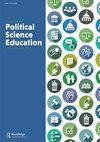从课堂到社区:大学生公民参与研究与学习项目的评估及其潜在意义
IF 0.6
Q3 POLITICAL SCIENCE
引用次数: 2
摘要
本科院校的公民教育对社会的公民健康至关重要,但教师往往难以将公民内容纳入现有课程,也缺乏将公民外展纳入课程的资源。因此,研究表明花在公民参与上的时间是有限的。此外,在政治科学或其他社会科学课程之外,很少讨论公民参与,更不用说鼓励了。在这篇文章中,我们评估了一个独特的课外公民参与研究和学习项目的结果,在这个项目中,本科生被要求与外部合作伙伴(通常是市政机构或非营利组织)合作,完成一个独立的研究项目。通过定量和定性的学生评估,我们发现学生们对这个项目有着压倒性的积极体验。他们特别赞赏有机会在跨学科的环境中研究“现实世界”的问题。他们还表达了想要一个更长时间的项目,超过一个学期。我们讨论了这些发现的潜在含义。本文章由计算机程序翻译,如有差异,请以英文原文为准。
From Classroom to Community: An Assessment and Potential Implications of an Undergraduate Civic Engagement Research and Learning Program
Abstract Civic education in undergraduate institutions is of vital importance to the civic health of society, but faculty often find it difficult to incorporate civic components into existing courses and lack the resources to incorporate civic outreach into their curriculum. As a result, research has shown that time spend on civic engagement is limited. Additionally, civic engagement is rarely discussed, much less encouraged, outside of political science or other social science classes. In this article, we assess the outcomes of a unique co-curricular civic engagement research and learning program in which undergraduate students are required to work with an external partner, usually a municipal agency or nonprofit, to complete an independent research project. Using quantitative and qualitative student evaluations, we find that students had an overwhelmingly positive experience with the program. They especially appreciated the opportunity to work on “real world” issues in an interdisciplinary setting. They also expressed a desire for a longer program that extended beyond a single semester. We discuss the potential implications of these findings.
求助全文
通过发布文献求助,成功后即可免费获取论文全文。
去求助
来源期刊

Journal of Political Science Education
POLITICAL SCIENCE-
CiteScore
1.80
自引率
36.40%
发文量
69
期刊介绍:
The Journal of Political Science Education is an intellectually rigorous, path-breaking, agenda-setting journal that publishes the highest quality scholarship on teaching and pedagogical issues in political science. The journal aims to represent the full range of questions, issues and approaches regarding political science education, including teaching-related issues, methods and techniques, learning/teaching activities and devices, educational assessment in political science, graduate education, and curriculum development. In particular, the journal''s Editors welcome studies that reflect the scholarship of teaching and learning, or works that would be informative and/or of practical use to the readers of the Journal of Political Science Education , and address topics in an empirical way, making use of the techniques that political scientists use in their own substantive research.
 求助内容:
求助内容: 应助结果提醒方式:
应助结果提醒方式:


